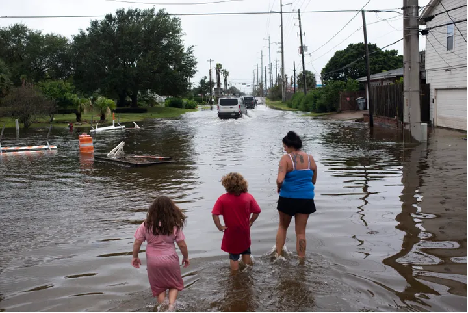Fracking Boom Could Lead to Housing Bust
August 18, 2013Fracking Boom Slouching Toward Bust
August 25, 2013By Jason Notte, MSN Money, August 21, 2013
Depending on where you stand and what’s beneath the ground you’re standing on, fracking is either paving the way toward American energy independence or dooming it to methane-addled water and man-made tremors.
The one certainty about fracking, however, is that it doesn’t exactly do wonders for property values.
As reported by The Atlantic, mortgage lenders are becoming more cautious about approving loans for properties near fracking sites. Lawyers, real estate agents, public officials and environmentalists have noted that banks and federal agencies are revisiting their lending policies to account for the potential impact of drilling on property values. In some cases they are refusing to finance property with or even near drilling activity.
That’s particularly problematic, considering that many home insurance policies do not cover residential properties with a gas lease or gas well, though all mortgage companies require home insurance from their borrowers. Part of the problem stems from uncertainty over the effects of the process itself.
As MSN Money writer Charley Blaine explains, fracking is technically “hydraulic fracturing,” which means using small explosions and lots of water and smaller amounts of chemicals to free up oil and gas resources locked in rocks far below the earth’s surface. Fracking was largely responsible for a 14.4% jump in U.S. oil production in 2012 to 6.47 million barrels a day — the most since 1995 — and has set off a huge boom in natural gas exploration and production in Texas, North Dakota (pictured), Montana and the Appalachians.
As a result, the U.S. imported just 41% of its oil in the first five months of 2013, the Energy Department says, down from 65% in 2005. Some projections say the combination of new supplies from fracking and alternative sources and energy savings from conservation could make the U.S. energy self-sufficient by 2030, although the country will still be an oil importer.
Critics don’t have to look very hard to find reason to fear the process, however. In the 2005 Energy Policy Act, the fracking industry was specifically exempted from violations under the federal Safe Drinking Water Act. State regulations weren’t affected, but the question is whether state regulators have the will or resources to act.
A New York Times report documented a contamination in Jackson County, W. Va., in the mid-1980s. And a Vanity Fair magazine article documented groundwater contamination issues around Dimock Township, a small town in northeast Pennsylvania, from wells drilled by Cabot Oil & Gas (COG -0.31%). The controversy was the basis for the anti-fracking movie “Gasland.”
Brian and Amy Smith live across the street from a new gas well in Daisytown, Pa., just an hour south of Pittsburgh. Last year, when they applied for a new mortgage on their $230,000 home and hobby farm, they were denied. ABC affiliate WTAE notes it’s the first case in western Pennsylvania of a homeowner being denied a mortgage because of gas drilling on a neighbor’s property.
Mortgage provisions prohibiting gas drilling, meanwhile, are becoming more common. The “mineral, oil and gas rights rider” on the loan paperwork at Sovereign Bank says the mortgage will be recalled automatically if the property owner transfers any oil or gas rights or allows any surface drilling activity. It also specifies that owners must “take affirmative steps to prevent the renewal or expansion” of a current gas lease.
The Federal Housing Administration’s lending guidelines prohibit the financing of homes within 300 feet of a property with an active or planned drilling site. Mortgage lenders Fannie Mae and Freddie Mac also prohibit property owners from signing a gas lease or keeping hazardous materials on their property. Doing so puts their mortgages in “technical default.”
While drilling companies tend to pay well for drilling rights, that’s of little use to homeowners if the property they’re sitting on can’t be sold or isn’t eligible for a mortgage if it does.



